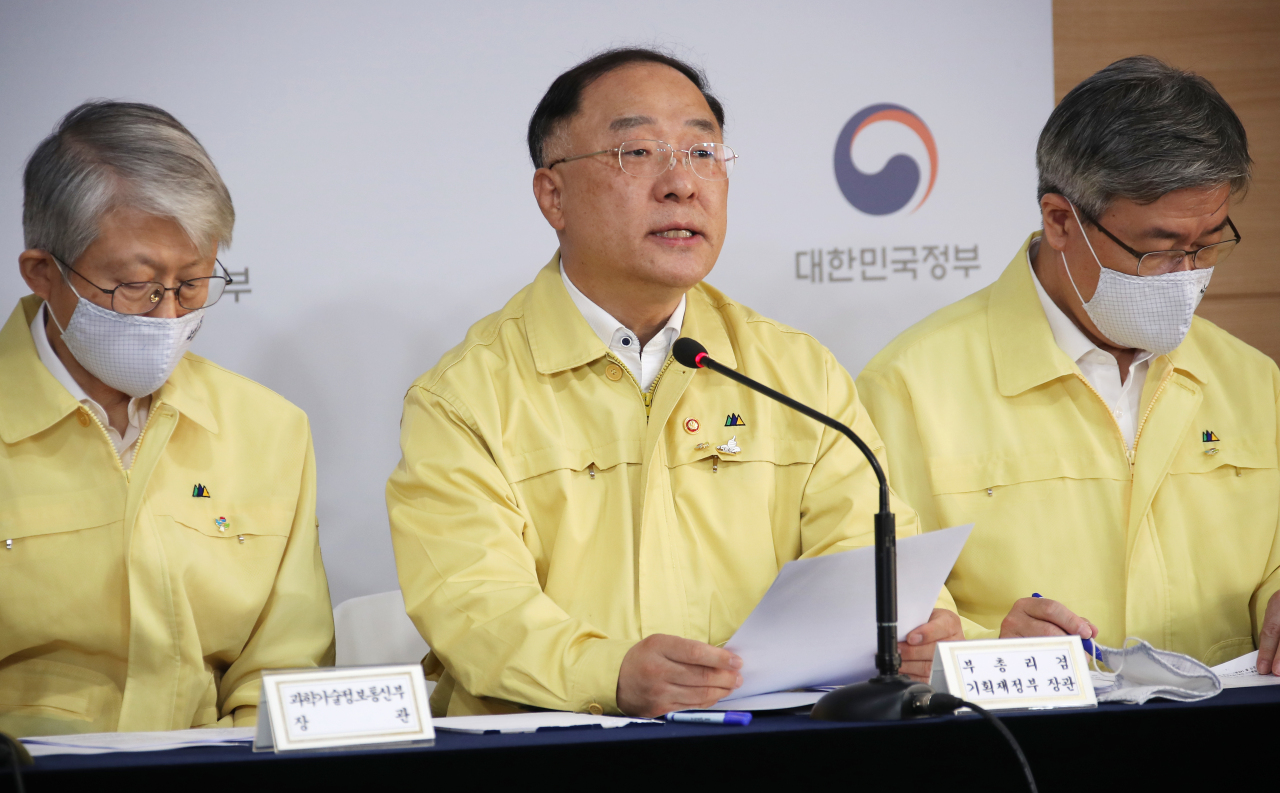‘Single-largest extra budget’ sought to deal with COVID-19 fallout
Imminent extra budget speculated to surpass W30tr
By Bae HyunjungPublished : June 1, 2020 - 16:36

South Korea’s government and ruling party on Monday vowed to effectuate “the single-largest supplementary budget ever” within this month to head off the economic fallout of the COVID-19 pandemic.
Seeking synergy with the upcoming “mega budget,” the country also rolled out its economic policy road map for the second half of the year, including its own version of the “New Deal” package.
“The government plans to submit the supplementary budget bill to the parliament on (June) 4,” said Deputy Prime Minister and Finance Minister Hong Nam-ki at a meeting with the ruling Democratic Party officials held at the National Assembly.
“In order to back the country’s fiscal operations, support the economic stimulus package for the second half of the year, and expand the social safety network, we have come up with the single-largest extra budget ever.”
While the budget bill is yet to be finalized, the amount is currently estimated at around 30 trillion won ($24.5 billion), surpassing the combined 24 trillion won covered by the two previous extra budgets.
In late April, the National Assembly approved a 12.2 trillion won extra budget as the country’s second fiscal response to COVID-19, following the first related budget worth 11.7 trillion won in March.
The fiscal chief also underlined timely action, vowing to execute 75 percent of the budget amount within three months from passage.
The finance minister’s urgent call for fiscal injection was echoed by the ruling party leadership.
“We need to establish a fiscal policy that provides against the worst situations possible,” said party Floor Leader Rep. Kim Tae-nyeon.
The Democratic Party currently controls the majority of 177 seats in the 300-member parliament.
The government and ruling party also reviewed the second-half economic policy road map, focusing on the so-called Korean-style New Deal. The move came about a month earlier than usual, as the half-year policy plans are usually unveiled in July.
Hong added at a press briefing held in the afternoon that despite possibilities of negative growth, he has set South Korea’s economic growth target for 2020 at 0.1 percent, citing policies including the supplementary budgets.
“The second quarter might be more difficult compared with the first due to a decline in exports from a global economic recession, but if the situation surrounding COVID-19 (begins to improve in the second-half of the year), positive growth is possible through policy effects,” Hong said.
Asia’s fourth-largest economy rolled out its “three plus three” plan, consisting of six pillars -- three for overcoming the economic crisis brought on by the latest pandemic and the rest that could help build strong foundations for the post-coronavirus era -- according to the Ministry of Economy and Finance.
The first three pillars were bolstering support measures that could help the economy overcome the crisis as soon as possible, bringing about a fast economic recovery that could become an example for other global economies and building a comprehensive risk management system for areas concerning or vulnerable to the pandemic such as quarantine and finance.
The government said in order to maintain the tone and momentum of the current active macroeconomic policies, it would “expand” its management of fiscal policies to overcome the current crisis. It vowed to make its best efforts to get the National Assembly’s approval for the third supplementary budget of 35.3 trillion won as swiftly as possible.
Operating support packages based on different risk levels tied to local businesses and protecting companies from succumbing to the pandemic were also major goals under the first three pillars. Various financial and loan support programs for the self-employed and small and medium-sized firms will either be maintained or expanded.
Discount coupons, expansion of usage of regional gift certificates and various events will be prepared to reinvigorate consumerism and the tourism sector. To revive the nation’s exports, it will provide financial support to help local firms with untact (non-face-to-face contact) marketing and hand them benefits when borrowing loans from financial institutions.
The New Deal package is a key part of the three pillars for establishing a system for the post-coronavirus economy. It is formed of three sub-packages -- digital, green and human -- focused on bolstering and overhauling different areas that could play crucial roles in building a strong economy in the modern era.
Of the third extra budget, 5.1 trillion won will be funneled for implementation of the package, the Finance Ministry said in a separate announcement.
For the digital package, the government plans to create a digital-friendly environment for citizens through establishing a data system that could cater to their livelihood. It aims to strengthen the nation’s cybersecurity system and expand 5G and Wi-Fi networks across the country. Untact businesses and industry will be fostered to boost education and healthcare sectors.
Emergency jobs will be created in the digital sector as well.
The green package promotes eco-friendly infrastructure including more usage of solar and wind energies and integration of smart systems and green businesses. Human package which will be further updated, plans to provide a safety net for the job market and improve work environments.
The details of the New Deal package will be confirmed by end-July.
Research and development for quarantine and bio industries will be fostered and a K-quarantine model –- based on the globally acclaimed measures Korea took to contain the spread of the coronavirus -- will also be systemized and exported.
By Bae Hyun-jung and Jung Min-kyung (tellme@heraldcorp.com)(mkjung@heraldcorp.com">tellme@heraldcorp.com)(mkjung@heraldcorp.com)


![[AtoZ into Korean mind] Humor in Korea: Navigating the line between what's funny and not](http://res.heraldm.com/phpwas/restmb_idxmake.php?idx=644&simg=/content/image/2024/04/22/20240422050642_0.jpg&u=)


![[Exclusive] Korean military set to ban iPhones over 'security' concerns](http://res.heraldm.com/phpwas/restmb_idxmake.php?idx=644&simg=/content/image/2024/04/23/20240423050599_0.jpg&u=20240423183955)
![[Herald Interview] Why Toss invited hackers to penetrate its system](http://res.heraldm.com/phpwas/restmb_idxmake.php?idx=644&simg=/content/image/2024/04/22/20240422050569_0.jpg&u=20240422150649)
![[Graphic News] 77% of young Koreans still financially dependent](http://res.heraldm.com/phpwas/restmb_idxmake.php?idx=644&simg=/content/image/2024/04/22/20240422050762_0.gif&u=)






![[Exclusive] Korean military to ban iPhones over security issues](http://res.heraldm.com/phpwas/restmb_idxmake.php?idx=652&simg=/content/image/2024/04/23/20240423050599_0.jpg&u=20240423183955)



![[Today’s K-pop] Ateez confirms US tour details](http://res.heraldm.com/phpwas/restmb_idxmake.php?idx=642&simg=/content/image/2024/04/23/20240423050700_0.jpg&u=)